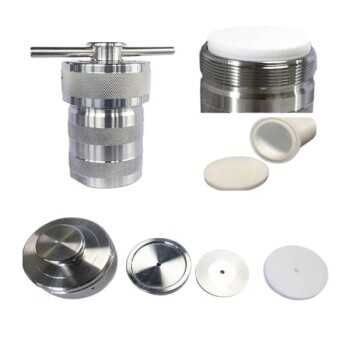Rotary evaporation is a common laboratory technique used to remove solvents from samples under reduced pressure. While it is a valuable tool, it comes with several hazards that must be carefully managed to ensure safety. These hazards include entanglement with rotating parts, implosions from flawed glassware, explosions from concentrating unstable impurities, and risks associated with handling reactive materials under vacuum. Proper precautions, such as wearing personal protective equipment (PPE), securing glassware, and controlling vacuum and temperature, are essential to mitigate these risks. This answer explores the hazards in detail and provides guidance on how to safely operate a rotary evaporator.
Key Points Explained:

-
Entanglement with Rotating Parts
- The rotating flask and other moving components of a rotary evaporator pose a significant entanglement risk. Loose clothing, hair, necklaces, or jewelry can get caught in the rotating parts, leading to injury.
-
Precautions:
- Avoid wearing loose clothing or accessories near the apparatus.
- Tie back long hair and secure any dangling items.
- Always ensure the rotating components are properly shielded or enclosed.
-
Implosions from Flawed Glassware
- Rotary evaporators operate under vacuum, which can cause flawed or weakened glassware to implode. This can result in flying glass shards and potential injury.
-
Precautions:
- Inspect all glassware for cracks, chips, or other defects before use.
- Use only high-quality, laboratory-grade glassware designed for vacuum applications.
- Secure glassware with clips (e.g., Keck clips) to prevent it from dislodging during operation.
-
Explosions from Concentrating Unstable Impurities
- Concentrating certain unstable compounds, such as organic azides, acetylides, nitro-containing compounds, or molecules with strain energy, can lead to explosions.
-
Precautions:
- Avoid concentrating unstable or reactive impurities.
- Use a bump trap to prevent contamination of the condenser and reduce the risk of explosions.
- Ensure the solvent collection flask is emptied to avoid mixing incompatible chemicals.
-
Violent Reactions with Air-Reactive Materials
- Operating under vacuum with air-reactive materials can be hazardous. A leak in the system can draw air into the apparatus, potentially causing a violent reaction.
-
Precautions:
- Exercise extra caution when working with air-reactive materials.
- Ensure the system is properly sealed and free of leaks.
- Use appropriate traps or condensers to manage volatile solvents.
-
Burns from Hot Surfaces
- The water bath used to heat the sample and the glassware itself can become very hot, posing a burn risk.
-
Precautions:
- Wear heat-resistant gloves when handling hot glassware or adjusting the water bath.
- Use caution when disassembling the equipment to avoid contact with hot surfaces.
-
Exposure to Solvent Vapors
- Solvent vapors released during evaporation can be harmful if inhaled or if they come into contact with skin or eyes.
-
Precautions:
- Work in a well-ventilated area or use a fume hood to manage solvent vapors.
- Wear appropriate PPE, including gloves, goggles, and a lab coat.
- Use liquid nitrogen or dry-ice condensers to collect volatile solvents safely.
-
Improper Vacuum and Temperature Control
- Incorrect vacuum pressure or water bath temperature can lead to bumping, splashing, or overheating of the sample.
-
Precautions:
- Adjust the vacuum pressure and water bath temperature to below the solvent's boiling point.
- Use a bump trap to prevent splashing and contamination.
- Monitor the rotation speed and adjust it as needed to ensure smooth operation.
-
Post-Evaporation Risks
- After evaporation, residual solvents or reactive compounds may remain in the system, posing risks during disassembly or cleaning.
-
Precautions:
- Release the vacuum and stop the rotation before disassembling the apparatus.
- Clean the bump trap and empty the receiving flask immediately after use.
- Handle any residual materials with care, especially if they are reactive or toxic.
By understanding and addressing these hazards, users can safely operate rotary evaporators and minimize the risk of accidents. Proper training, adherence to safety protocols, and the use of appropriate equipment and PPE are essential for ensuring a safe laboratory environment.
Summary Table:
| Hazard | Precautions |
|---|---|
| Entanglement with rotating parts | Avoid loose clothing, secure hair, and shield rotating components. |
| Implosions from flawed glassware | Inspect glassware, use high-quality materials, and secure with clips. |
| Explosions from unstable compounds | Avoid concentrating unstable impurities; use bump traps and empty flasks. |
| Violent reactions with air-reactive materials | Seal the system, use traps, and handle with caution. |
| Burns from hot surfaces | Wear heat-resistant gloves and handle hot glassware carefully. |
| Exposure to solvent vapors | Use fume hoods, wear PPE, and employ liquid nitrogen condensers. |
| Improper vacuum and temperature control | Adjust settings, use bump traps, and monitor rotation speed. |
| Post-evaporation risks | Release vacuum, clean traps, and handle residual materials safely. |
Ensure your lab's safety with expert guidance—contact us today for more information!











